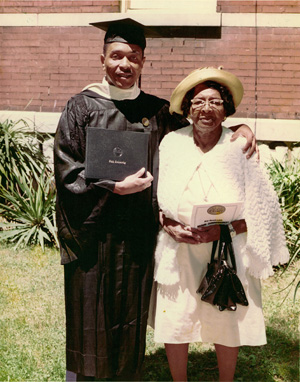Ted Jarrett, the legendary songwriter, producer and record-label owner who helped make Nashville a soul-music hub in the 1950s and '60s, died Saturday night while in hospice care. He was 83.
With him passes an alternate history of Nashville music—a saga in which, among other chapters, a Fisk graduate's music crosses the ocean, influences a generation of British kids, and changes rock 'n' roll history.
"Ted was the godfather of local R&B," says Johnny Jones, the famed Nashville blues guitarist who played on many of his classic singles. For more than half a century, Jarrett was a constant in Nashville soul and gospel music, a man who filled every position in the music business from road manager to record-store owner. But it was as a songwriter, producer and label chief that Jarrett made his lasting mark, after a rocky childhood that made the title of his career-defining hit "You Can Make It if You Try" more than an empty claim.
Jarrett was born in 1925 to what he described as an upper-class household at the corner of 12th Avenue North and Pearl. His life might have turned out differently had his father, a sharp-dressed blade who ran hooch for a Jewish bootlegger, not been seeing a woman on the side. One day in 1927, her boyfriend and Jarrett's father exchanged words, then mustered forces for an all-out gunfight. Though Jarrett was only 2 years old, he wrote in his 2005 autobiography, he could still remember the night his father was killed.
After years of dwindling resources, the 7-year-old Jarrett and his sister Dorothy were taken in by his step-grandfather on a farm outside Nashville. The boy's relative comfort yielded to poverty and a life of cotton picking. Worse than the work, he wrote, was his new parent figure's violent temper. When the chubby, artistic boy saw a magazine ad asking for song lyrics and sent in a few poems, his Papa threatened him with a beating.
"Only white boys write songs," he told the young Jarrett. "Black boys don't write songs."
Jarrett would prove him wrong. He fled back to Nashville after eight years in the country and enrolled at Pearl High School. After class, he worked enough to barely pay his mother's rent and put down $14 on a used piano, scrimping to afford his 50-cent piano lessons. He was about to realize his dream of attending Fisk University in 1944 when he was sidetracked by induction into the Navy.
In 1951, he became a dee-jay for Nashville's WSOK, one of the country's first full-time African American radio stations. Throughout the early 1950s, he worked in A&R for the pioneering local label Tennessee Records, even as he took classes at Fisk.
School fell by the wayside for almost 20 more years when Jarrett scored his first major success as writer and producer. The song, "It's Love Baby (24 Hours a Day)," was something he'd written while performing late-night gigs at a white downtown club called the Pink Elephant. In 1955, he recorded a version credited to Louis Brooks & His Hi-Toppers, even though a teenage powerhouse named Earl Gaines, a friend of Jarrett's from the club scene, socked it across with a dynamic vocal.
"He didn't give [the song] to me at first," recalls Gaines, Jarrett's friend for nearly 60 years, who re-recorded the song for his new CD Nothin' but the Blues. "He made me wait three months for it."
It was worth the wait. Not only did their version hit No. 2 on the Billboard R&B chart, covers by Hank Ballard & the Midnighters and Ruth Brown the same year also stormed the Top 10.
His epitaph, though, may be "You Can Make It if You Try," a stunning single by Nashville soul vocalist Gene Allison that Jarrett wrote and produced in 1957. It's a majestic and unsettling song—indefatigably optimistic in its soaring chorus, yet bitterly truthful about the cost of making it. "Sometimes you have to cry," Allison sang over a funereal organ and the stately backing of trumpeter Joe Morris' band. "Sometimes you have to lie."
Jarrett wrote the song after a bad date left him weeping from heartache on his mother's floor. (Ashamed, he told her it was only a stomachache.) But to audiences in the Jim Crow-era South, its brutal pragmatism addressed a world of hurts. "You Can Make It if You Try" became a smash, crossing over to the Billboard pop chart alongside a stay in the R&B Top Five.
Among its fans were members of a fledgling British rock band, who revered the R&B records they ordered from Nashville retailers such as Ernie's Record Mart. And so Jarrett ended up with a cut on England's Newest Hit Makers, the first U.S. release by the Rolling Stones.
Levert Allison, Gene's brother, who worked with Jarrett both as a solo artist and a member of the gospel group the Dynamic Dixie Travelers, remembers Jarrett in the studio as an exacting, even eccentric perfectionist who didn't mind rubbing people the wrong way to realize the music in his head.
"They talk about James Brown being hard to work with," Allison says, "but he just wanted things right. These guys who are geniuses, they want things right. That's how it was with him. He was the man who could get you where you wanted to be. Get on my nerves all you want, just get me a hit record out there."
That doesn't mean, Allison remembers with a chuckle, that players wouldn't stifle a laugh whenever Jarrett would demand perfection by shouting, "Knock my drawers off!" But he's just as quick to acknowledge Jarrett's good-hearted nature and generosity with his talent.
"Ted is the reason I'm here," says Johnny Jones, who was backing female impersonators with a combo in a Clarksville watering hole when Jarrett drafted him for Gene Allison's band in 1958. Jones credits Jarrett with teaching him to read music, expanding his reach as a musician, and employing black and white musicians in the same sessions when race mixing was still taboo. He had no idea the songs he cut with Jarrett back then would survive.
"That's the irony of American history," Jones says. "When you're making it, you don't really see it."
Unlike so many of Nashville's R&B greats—including, tragically, Gene Allison—Jarrett lived to see his music embraced by a wide new audience. Starting in the mid-1990s, several sterling soul compilations both here and abroad collected the singles Jarrett released on labels such as Excello, Champion, Calvert, Cherokee, Poncello, Ref-O-Ree and Valdot. They brought new attention to artists like his close friend Gaines and vocalist Roscoe Shelton.
The capstone of Jarrett's career proved to be the Country Music Hall of Fame's Grammy-winning 2004 Night Train to Nashville CD compilation and the 21-month exhibit that accompanied it—an overdue celebration of Nashville soul that captured the city's attention. Represented by six tracks on the first volume alone, Jarrett emerged from the Night Train project as a key figure in Nashville music: a direct link between country (he penned Webb Pierce's 1955 honky-tonk hit "Love, Love, Love," one of the few No. 1 singles in country history written by an African American) and soul.
"He had his hands in so many aspects of the music business that the Nashville R&B scene wouldn't have been the same without him," says Michael Gray, who co-produced with Dan Cooper the Night Train CDs and exhibit. "He's the focal point for any serious discussion of the music."
Jarrett basked in the glow of his newfound recognition at a 2005 Hall of Fame gala, where "Sunny" singer Bobby Hebb, Levert Allison, country-soul great Tracy Nelson and others gathered to sing his songs. The occasion was the release of Jarrett's autobiography; its title, fittingly enough, was You Can Make It if You Try. Ted Jarrett could, and he did.
"I don't see Ted as a loss," Johnny Jones says. "He lives in me and everybody he came in contact with. I still see Ted every time I look at a page of music."
A memorial for Ted Jarrett will be held 11 a.m. Thursday, March 26, at Greater St. John Missionary Baptist Church, 2200 26th Avenue North off Clarksville Highway, with visitation at 10 a.m.
Email jridley@nashvillescene.com, or call 615-844-9402.







